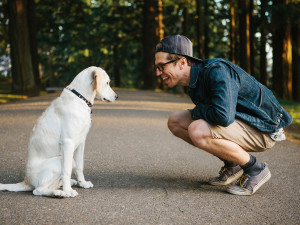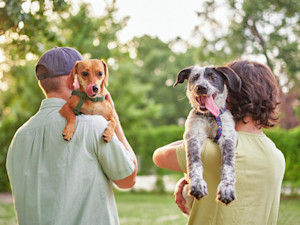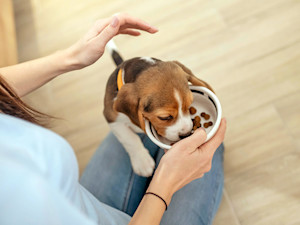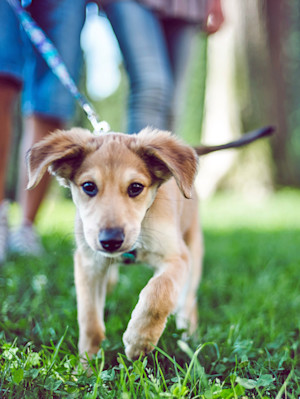How to Prepare for Your Puppy’s First Vet Visit
The list is long, but you can do it!
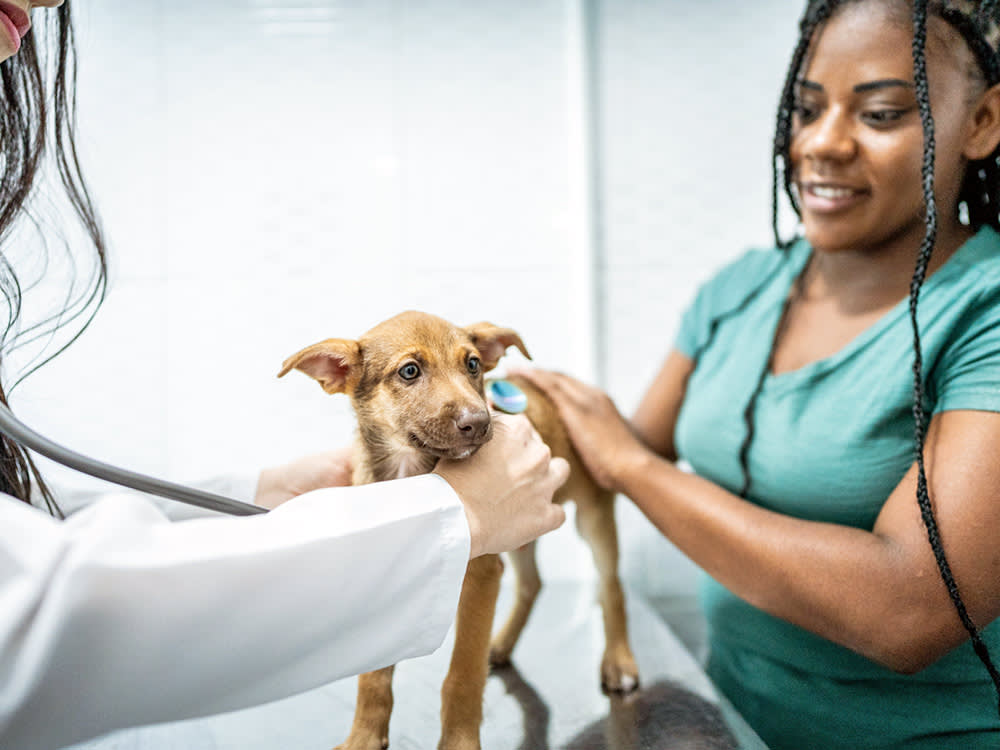
Share Article
In This Article:
Vet Paperworkopens in a new tab Questions for the Vetopens in a new tab How to Curb Anxietyopens in a new tab Travel Considerationsopens in a new tab
I’ve searched for the best bed, picked a diet that seems right for my new puppy, and read every training guide I can find. I’m still nervous about bringing my puppy to the vet for the first time, though. How do I prepare for the visit, and what can I do to make it easier for my puppy?
Even though you know that regular vet visits are vital to your puppy’s wellbeingopens in a new tab, it can still be scary to bring them to the clinic for the first time. What if they’re frightened or start to misbehave? What if a bad initial experience makes every future vet visit a struggle for your puppy? Doing some basic prep work can help you make their first puppy vet visit a positive experience.

littleKin™ is Kinship’s home just for puppy and kitten parents. Bop over to check out expert advice, new pet tools, and special deals—all curated for your newest family member.
opens in a new tabWhat paperwork should you prepare for a vet visit?
Some puppies come with paperwork, but others don’t. Your fancy AKC-registered puppy that can trace their lineage back to the first dog who sat on an emperor’s lap probably has a lot of paperwork documenting their date of birth, breed, medical history, and Zodiac sign. If you adopted a stray puppy, identifying documents may be more scarce. That’s fine, your vet can help get them started on the right trackopens in a new tab anyway.
Bring any information you have about them to your first vet appointment. When thinking about what to bring to the first vet visit, dog and puppy parents should prepare details about:
Vaccination
Depending on their age, your puppy may have received some vaccines already. Paperwork you received with your puppy may include information about dates of previous vaccinations, what type of vaccines were given, and if there were any adverse reactions to those vaccines. This type of info allows your vet to set up a personalized vaccination scheduleopens in a new tab for your puppy so that they can continue to be protected from common viruses.
Deworming
Similar to your puppy’s vaccination historyopens in a new tab, their deworming records can help your vet best determine what future treatments are needed. Puppies are dewormed frequently, and different types of dewormers are used for different parasite problems.
Diet and food
Even though you may have spent a bunch of time picking out the perfect food for your puppy, it can sometimes be difficult to recall the exact brand and product name when you’re asked. It’s best to just take a picture of the bag for your vet so they can know what your puppy is eating. If you don’t weigh your puppy’s food for each mealopens in a new tab, bring the scoop you’re using so they can see exactly how much your puppy eats. You’d be surprised by how many people claim that they only feed “one cup” of food, but don’t mention that it’s a Big Gulp-sized cup.
Pet insurance
Having pet insuranceopens in a new tab can be a great way to prepare for unexpected expenses for your dog. If you’re getting pet insurance, starting it during puppyhood helps prevent future issues with denied claims due to preexisting conditions. Your vet’s office can keep this information on file so that they can assist with future claims.
Adoption information
Having your new puppy’s adoption information available for your vet is surprisingly helpful. In addition to providing records of vaccinations, dewormings, and any medical problems, adoption papers can let your vet know if your puppy came from a different region of the country. This can be important information because certain diseases (like heartworm diseaseopens in a new tab) are more common in some areas than others.
What questions you should ask your vet
It’s very easy for your mind to go blank when your vet asks if you have any questionsopens in a new tab about your new puppy. Starting a list of queries and concerns before your puppy’s first vet visit can help to keep your thoughts organized in the moment. Some common topics new pet parents have questions about include:
Vaccination schedule
While this is usually covered in detail during your puppy’s first vet visit, make sure you’re clear on the timing of appointments for vaccines opens in a new tabbefore you leave the clinic. You’ll be seeing your vet frequently in the first months of your puppy’s life, so making sure you know what to expect at each visit is important.
Parasite medications
There are a multitude of parasite medicationsopens in a new tab available. Fleas, ticks, heartworms, mange, flies, intestinal worms, and ear mitesopens in a new tab are just some of the parasites that can trouble puppies. Preventative medications are available for many parasites, and they come in a variety of formulations. Ask your veterinarian about what medications are most appropriate for the parasites in your area, and what formulation (oral, injectable, or spot-on) will work best for your puppy.
Diet, nutrition, and growth
Diet is an important topic to cover during your puppy’s first vet appointment. One of the goals for the visit should be making sure your puppy is consuming the right amount of the right diet for their life stage. Ask questions to get a detailed picture of how to adjust as your puppy grows. This includes finding out what treats, chews, and human foods are safe and appropriate to share with your puppy.
Spaying or neutering
Recommendations about the best time to spay or neuteropens in a new tab your puppy vary widely. Large dogs tend to be fixed a little later in life than smaller ones, and every vet’s recommendation about the best way to time the procedure will vary. Ask your vet questions about the pros and cons of early spay or neuter and make sure you understand the time frame they recommend.
Exercise and socialization
Puppies sometimes seem to have boundless energy. Finding ways to tire them out can be a challenge, so talk to your vet about strategies to convert their energy into productive training sessions and appropriate play. It’s important to socialize your new puppy so they’re familiar with a variety of people, pets, places, and situations while they’re most open to learning. Ask your vet about safe ways to socializeopens in a new tab your puppy while minimizing their risk of catching a disease while their immune system is still developing.
How to reduce your puppy’s anxiety around vet visits
Despite your best efforts to socialize them, your puppy may show some signs of anxiety during their first vet visit. This isn’t entirely unexpected because they’re visiting an unfamiliar environment with a lot of new things happening. You can take some steps to help reduce your puppy’s anxietyopens in a new tab for their first vet visit. Starting these strategies early can pay off with reduced vet anxietyopens in a new tab throughout their life:
Exercise beforehand: A tired puppy is a happy puppy. It’s hard to get too overstimulated when you just want to take a nap. Don’t wear them out to the point of complete exhaustion, but a little extra activity before visiting the vet may help your puppy stay calm.
Gather toys and blankets: If you’re wondering what to bring to the first vet visit for your puppy, familiar toys and blankets top the list. Your puppy may appreciate having the familiar scent of some bedding from home and their favorite toy available as a distraction.
Grab some treats: Your vet will likely have tasty snacks to distract your puppy during their visit, but bringing along some treats that you know they love won’t hurt. They can be used to reinforce good behavior during the car ride or wait in the lobbyopens in a new tab.
Simulate vet inspection: One of the most important things you can do before the first vet visit for your puppy is getting them used to being gently poked and prodded. This means acclimating them to having their paws touched, tail lifted, and mouth examined. Making these activities part of playtime makes it less weird for your puppy when your vet does them as part of their examination.
Take car rides to fun places: If one of the only times your puppy gets into the caropens in a new tab is to go to the vet, they may start to act out before you even get to the clinic. Be sure to add some variety to their trips so that they don’t only associate the car with the vet’s office.
How to prepare for the trip
If you’ve never had a puppy before, your first vet visit costopens in a new tab with them may be a surprise. Call around to clinics in your area first to find out the expected price and see if they have any packages available that cover all the expected puppy vaccination appointments.
The actual process of getting your puppy to the vet may involve more than you expect. For your puppy’s first vet visitopens in a new tab, a checklist can help to keep things organized and reduce confusion the day of the visit. A checklist for the vet visit may include things like:
Preparing the crate
Buying a collar or harness and leash
Securing the travel kennel in the car
Having supplies to deal with pee, poop, or car sickness
Packing toys and treats
Bottom line
Preparing for your puppy's first vet visit requires careful planning to ensure a smooth experience. Gather all available medical records, including any previous vaccinations or deworming documentation from the breeder or shelter. Make a list of questions about feeding, vaccinations, and breed-specific concerns.
References
“Getting to Know My Veterinarian | Indoor Pet Initiative.” Osu.edu, 2025, indoorpet.osu.edu/dogs/puppy/getting-know-my-veterinarianopens in a new tab. Accessed 31 Mar. 2025.
“Guide for Taking Care of Animals.” Ross Vet, 20 June 2023, veterinary.rossu.edu/about/blog/guide-for-taking-care-of-animalsopens in a new tab.
“How to Prepare for Your New Puppy.” Veterinary Medicine at Illinois, vetmed.illinois.edu/pet-health-columns/how-to-prepare-for-your-new-puppy/opens in a new tab.
“How to Prepare Your Pet for a Low-Stress Vet Visit.” News from the College of Veterinary Medicine and Biomedical Sciences, 7 Apr. 2022, cvmbs.source.colostate.edu/how-to-prepare-your-pet-for-a-low-stress-vet-visit/opens in a new tab.
“The Puppy Timeline: Physical and Mental Changes.” VMBS News, 19 May 2023, vetmed.tamu.edu/news/pet-talk/puppy-timeline-part-1/opens in a new tab.
“Things You Need to Know before You Bring Home Your New Puppy.” News.vt.edu, news.vt.edu/articles/2024/03/vetmed-new-puppy.htmlopens in a new tab.

Dr. Bartley Harrison, DVM
Dr. Bartley Harrison, DVM is a small animal veterinarian based in North Carolina who has practiced emergency medicine since graduating from the Texas A&M College of Veterinary Medicine. His primary interest areas include pain management, cardiology, and the treatment of shock.
He is a member of the Veterinary Emergency and Critical Care Society, American Veterinary Medical Association, and American Medical Writers Association. In addition to his clinical work, he writes pet health articles to help provide accurate information for both new and experienced pet parents. When he’s not working, he enjoys cooking, traveling, reading, and going on adventures with his dog.
Related articles
![Border Collie puppy shaking owner's hand]() opens in a new tab
opens in a new tabWhen to Start Training a Puppy: a Complete Puppy Training Schedule By Age
Your puppy training schedule, from eight weeks to six months. Let’s do this.
![Two men carrying their puppies outside in the park.]() opens in a new tab
opens in a new tabHere’s When Your Puppy Can Be Around Other Dogs
Balancing puppy socialization and safety is tricky.
- opens in a new tab
When Should a Puppy Be Toilet-Trained?
Follow these careful steps.
![Woman feeding puppy from a bowl at home.]() opens in a new tab
opens in a new tabPuppy-Feeding Schedule 101
They might act hungry all day, but it’s up to you to know the facts.
![Couple walking their new puppy outside in the grass.]() opens in a new tab
opens in a new tabHow to Potty Train a Puppy: From Pee Pad to Outside
And learn how often they have to go outside.
![Two hands holding a very young tan and white puppy up in front of a lake landscape]()
How to Socialize a Puppy
Everything you need to know to get your new addition off to a good start.
